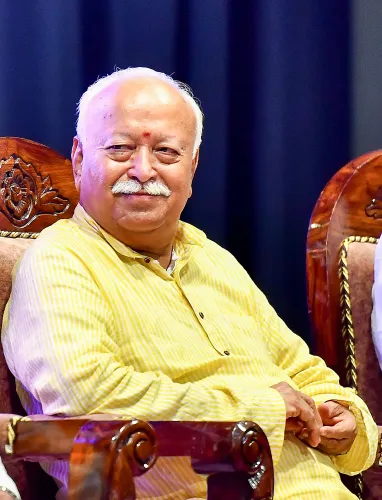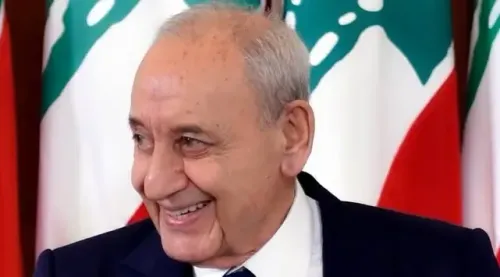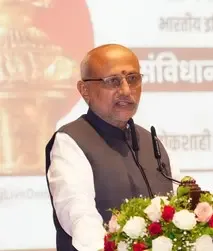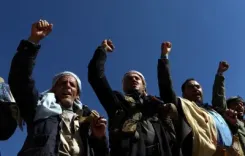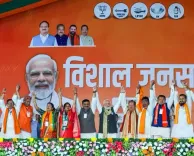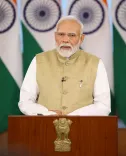Did ‘Vande Mataram’ Become the Dawn-Song of Awakening?

Synopsis
Key Takeaways
- Vande Mataram is a symbol of India's freedom struggle.
- It was composed in 1875 by Bankim Chandra Chattopadhyay.
- The song transcends linguistic and regional barriers.
- It continues to inspire national unity and cultural nationalism.
- The government is organizing celebrations for its 150th anniversary.
New Delhi, Nov 7 (NationPress) As the country commemorates the 150th anniversary of the National Song Vande Mataram, Union Home Minister Amit Shah took to his blog on Friday to express that Vande Mataram, penned during one of the most oppressive periods of colonial rule, emerged as the “dawn-song of awakening”.
In a post shared on the social media platform X, the Home Minister remarked, “Written during one of the darkest hours of colonial rule, ‘Vande Mataram’ became the dawn-song of awakening. This sacred chant will continue to echo through eternity, reminding us to view our history, our culture, our values and our traditions through the vision of Bharatiyata.”
In his reflective blog entry, Amit Shah delved into the profound historical and cultural importance of Vande Mataram.
He stated, “There have been many defining moments in our history when songs and art became the soul of social and political movements. The war songs of Chhatrapati Shivaji Maharaj’s army, the patriotic anthems sung during the freedom struggle, or the songs of resistance sung by the youth during the Emergency, songs have always awakened collective consciousness and unity in Bharatiya society.”
“Among them stands ‘Vande Mataram’, Bharat’s national song. It did not emanate from a battlefield but in the calm yet resolute mind of a scholar, Bankim Chandra Chattopadhyay. In 1875, on the day of Jagaddhatri Puja (Kartik Shukla Navami or Akshaya Navami), he composed the eternal anthem of the nation’s freedom. He drew inspiration from Bharat’s deepest civilisational roots, from the Atharva Veda’s declaration “Mata bhumih putro aham prithivyah” (“The earth is my mother, and I am her son”) to the Devi Mahatmya’s invocation of the Divine Mother, HM Shah remarked.
He emphasized that Bankim Babu’s words were both a prayer and a prophecy. It was Bankim Chandra’s initial proclamation of Cultural Nationalism, reminding us that Bharat is not merely a geographical territory, “but a geo-cultural civilisation.”
Citing Maharshi Aurobindo, the Home Minister noted that, as Maharshi Aurobindo articulated, Bankim Babu was a sage of modern Bharat who reawakened the soul of the nation through his words. His novel 'Anandamath' also served as a mantra in prose that stirred a sleeping nation to rediscover its divine strength. In one of his letters, Bankim Babu stated, “I shall have no objection if all my works are lost in the Ganga; this one hymn alone will live through eternity. It will be a great song and will win the hearts of the people.” These words were prophetic. Only an individual brimming with devotion to the motherland could have penned such lines, he said.
Amit Shah further highlighted that Vande Mataram transcended barriers of language and region, resonating across Bharat.
“Vande Mataram transcended barriers of language and region, echoing across Bharat. In Tamil Nadu, Subramania Bharati rendered it in Tamil, and in Punjab, revolutionaries sang it in defiance of British rule. During the partition of Bengal in 1905, amidst rebellion sweeping across the province, the British prohibited public recitations of ‘Vande Mataram’. Yet on 14 April 1906, in Barisal, thousands defied the order. When the police charged upon the peaceful crowd, men and women alike stood bleeding on the streets, chanting ‘Vande Mataram’ in unison,” he recounted.
He also recalled how the sacred chant inspired Indian revolutionaries globally.
HM Shah stated that this sacred chant was embraced by the revolutionaries of the Ghadar Party in California, the Azad Hind Fauj, and during the mutiny of the Royal Indian Navy in 1946, from Khudiram Bose to Ashfaqulla Khan, and from Chandrashekhar Azad to Tiruppur Kumaran, the slogan resonated as one.
He pointed out that Mahatma Gandhi himself acknowledged that ‘Vande Mataram’ possessed the magical ability to stir even the dullest blood. It united liberals and revolutionaries, scholars and soldiers alike. “As Maharshi Aurobindo declared, it was 'the mantra of Bharat’s rebirth,'” Shah wrote.
Highlighting the government's ongoing efforts to honor the song's legacy, Shah noted that on October 26, during his 'Mann Ki Baat' address, Prime Minister Narendra Modi reminded the nation of Vande Mataram’s glorious legacy. To commemorate 150 years of this immortal hymn, the Government of India has decided to organize nationwide programs for a year commencing November 7. “Through these celebrations, the full version of ‘Vande Mataram’ will resonate across the nation once again, inspiring the youth to internalize the idea of Cultural Nationalism,” HM Shah stated.
Drawing a connection between Vande Mataram and the unification of India, he remarked that as the country celebrates Bharat Parv and pays homage to Sardar Vallabhbhai Patel on his birth anniversary, people are reminded of how Sardar’s unification of Bharat was the living embodiment of the spirit of ‘Vande Mataram’. “This song is not merely a remembrance of the past but also a call to the future. Even today, Vande Mataram inspires our vision of Viksit Bharat 2047, a confident, self-reliant, and resurgent Bharat,” he concluded.
In closing, the Home Minister stated, “Vande Mataram is the song of freedom, the spirit of unyielding resolve and the first mantra of Bharat’s awakening. This sacred chant will continue to echo through eternity, reminding us to view our history, our culture, our values and our traditions through the vision of Bharatiyata (Indianness). Vande Mataram.”

